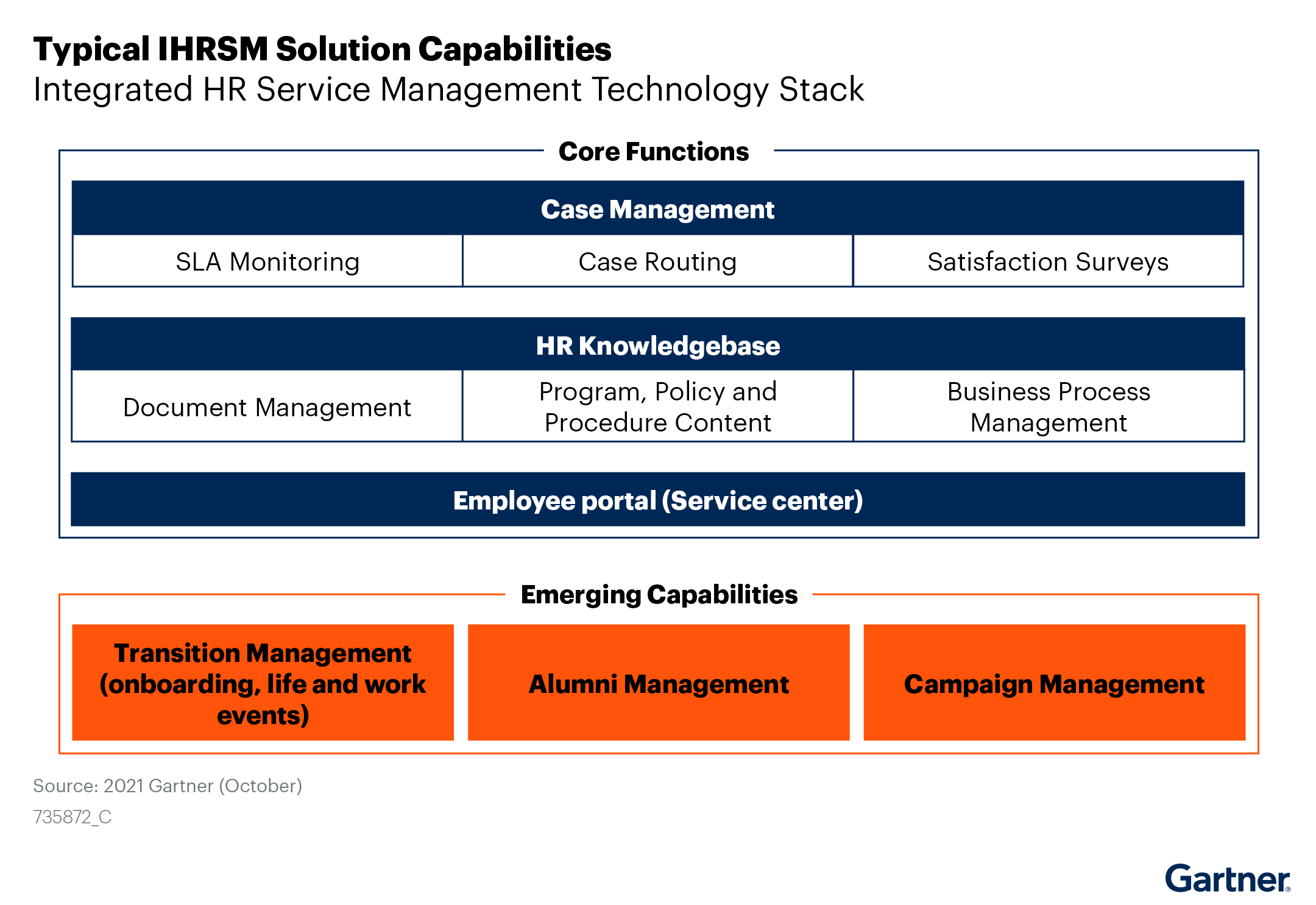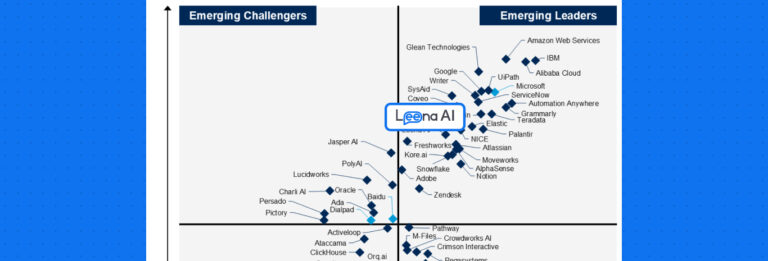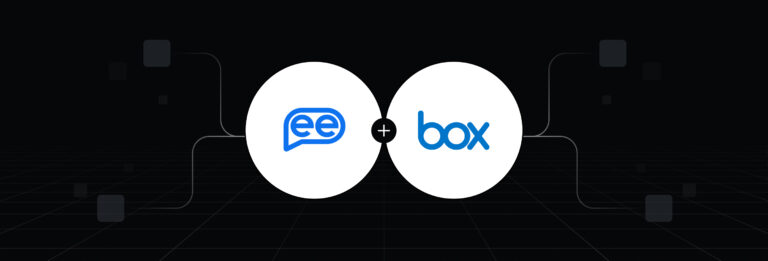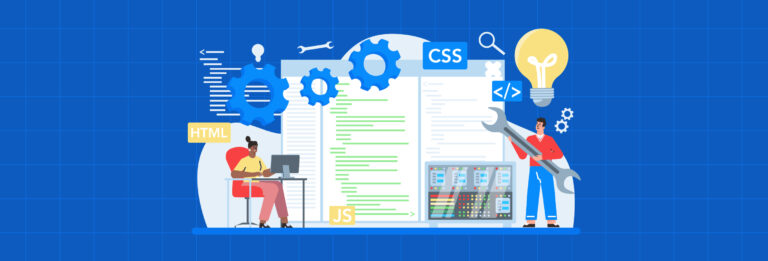Organizations have undergone profound upheaval due to the pandemic. It has brought an immediate change in how organizations operate and employees work in the remote or hybrid work setup.
Business leaders are finding it extremely challenging to keep up the pace with the unanticipated transformation and its ramifications. To ensure that their organization does not fall behind in terms of employee experience and HR service management, they must employ the biggest workplace disruptor, Artificial Intelligence (AI).
Gartner Market Guide for Integrated HR Service Management Solution emphasizes that providing a positive employee experience has become the top criterion for many organizations. As a result, there has been an upsurge in the adoption of IHRSM solutions over the past two years.
By 2024, 70% of organizations with more than 2,500 employees would have invested in an IHRSM solution – Gartner
Using this blog, the application leaders can assess the different types of Integrated HR service management (IHRSM) solutions available in the market and decide the best fit for their organization as per the requirements.
IHRSM solutions facilitate employee self-service
As per the Gartner Market Guide, “IHRSM solutions cater to all-inclusive platforms, to help organizations manage their physical and virtual HR shared services operations and communications. They also provide information to employees and managers for supporting employee-related processes, policies, and programs”.
The major functionalities of IHRSM solutions are-
- Employee and manager content delivery via a dedicated HR portal.
- Content knowledge bases
- Digital management of HR documents
- Business process management tools
- Case-ticketing and routing
- Service-level agreement (SLA) monitoring
- Employee relationship support
- Single sign-on (SSO) to transactional systems.
Get your complimentary copy of the Gartner market guide NOW!
Send me a copyIHRSM solutions integrate with a plethora of applications, such as administrative HR applications, enterprise portals, identity management applications, and provisioning systems. Its processes and applications bring together organization-wide workflows such as IT, purchasing, and facilities to provide an immersive experience to your employees.
Most IHRSM solutions also integrate with employee collaboration tools such as Microsoft Teams, Slack, enterprise messenger applications, and virtual assistant applications. You can utilize them based on the urgency and the kind of service requests.
For instance,
- Tools like Microsoft Teams or Slack are best-suited for the scenarios when employees require static information, such as finding relevant documents from a policy database or document repository.
- Virtual assistants are the best fit when employee-generated queries require collaboration with a third-party system for displaying authenticated information (like personal vacation balance), processing the request, and updating the system post any action.
- Portals are used when conversations around gender pay equity, harassment, or whistleblowing happen and require human interactions.
Generally, these solutions are marketed as an amalgamation of HR knowledge base and integrated case management application. However, they can be classified into different categories, depending on their capabilities.
Here is a table illustrating the common capabilities of the IHRSM solutions. Additionally, the table gives an overview of different modules of HCM technology that are currently supported by these solutions.

Types of integrated HR service management solutions
With the increase in demand for IHRSM solutions, there has been a profusion of vendors also. The potential to generate new revenue sources has appealed to several vendors over the past five years. These entrants have originated from various related markets. They include HCM suite vendors, document management providers, ITSM platforms, CRM vendors, low-code application platform providers, and HR consultancies. These products have some unique characteristics depending on the original technology or domain expertise of their vendors.
Gartner inquiry data indicates a 38% increase in the volume of calls on IHRSM from 2020, and an aggregate 35% compound annual growth rate (CAGR) over the period of 2019-2021.
Consultancy solutions
Some consultancies offer software solutions besides providing their core service, that is, consulting. The consultancy solutions are engineered by the tailoring platforms available in the industry.
These solutions can transform your business and address the significant operational shifts associated with moving toward a shared service model. The consultancies support you in branding and customization too.
The downside is that the maintenance of these customized solutions depends on the consultancies. As the technology gets obsolete, it’s unlikely for the consultancy to introduce new/updated solutions, as it doesn’t fall under their core competency.
These types of solutions are best-suited for-
- Organizations looking for extensive operational transformation
- Organizations requiring a high level of customization to meet their branding requirements and showcase the corporate culture
Content services-based solutions
These solutions originate from content services platforms and their capabilities include knowledge-base creation, document management, and document workflow. These solutions prove effective in policy support, forms, and broadcasting information.
As these solutions have case management and business processes atop their content systems, they may lack features such as workflow, BPM, and advanced analytics.
They are best suited for organizations that-
- Have comprehensive and complex HR policies
- Have a great number of workers managing a myriad of documents. For instance, employment contracts or employee verification letters.
CRM-based solutions
The vendors in this category were the first who realized the significance of an external self-service portal for delivering a better user experience to consumers. CRM-based solutions are built on robust technology platforms, including BPM, advanced workflow and AI, machine learning (ML), virtual agents, chatbots, integrated chat support, and automated load balancing.
They enable the HRs to manage their relationships with the candidates. However, they aren’t ready-to-use due to the issues like data privacy and HR’s obligation to offer support in cases such as disciplinary action and workplace injury.
Solutions in this category are best-fit for-
- Large organizations that need technical support and consumer-like support
- Organizations who are already customers of a CRM vendor and wish to drive a total experience initiative
HCM suites
HCM suite vendors are increasingly focusing on developing or acquiring IHRSM functionality. Their applications have inbuilt knowledge base search and case management capabilities which give the advantage of preconfigured and deep integration with transactions – beyond what third-party SSO can deliver. Another advantage is persistent user experience.
While some solutions are designed to be sold as stand-alone IHRSM, others are not. Certain HCM suite vendors provide service management solutions too, in the form of VAs or personalized content search. However, they lack case management and other essential IHRSM elements.
Natively built HCM suite IHRSM solutions are suitable for organizations that are existing HCM suite customers. Acquired solutions can be sold independently.
IHRSM point solutions
Vendors in this category possess extensive knowledge of HR business processes and support, HR service best practices, predefined HR constructs, and HR-specific content taxonomy and case management expertise.
They have been in the market for the longest time with their focus on the HR domain predominantly. However, their inability to support emerging technologies such as AI, ML, and virtual agents, can become a stumbling block for organizations.
Solutions in this category are for-
- Organizations seeking out-of-the-box HR configurations and HR-specific domain knowledge
- Seeking expert guidance on business transformation.
ITSM-based solution
These solutions are engineered using robust technology, such as BPM, advanced workflow, AI, ML, chatbots, virtual agents, automated load balancing, and telephony integration.
However, in some specific cases, ITSM solutions don’t work outside the box for complex cases such as whistleblowing or harassment. The vendor in this category may not offer extensive, prepackaged, legally defensible content or forms.
Such solutions work for organizations that-
- Require out-of-the-box technical capabilities
- Already use vendor’s IT help desk services and want to give their employees unified experience across the service management platforms.
Employee relations case management specialists
These solution vendors have the necessary capabilities to support the investigation and evaluation of employees’ policies violation and serious allegations that require careful inspection. They also assist in preparing court-related documents and in some cases, offer legal advice. The solutions can be utilized solely for the HR domain. Advanced technologies such as VA, or AI and ML use cases are offered to some extent.
Being country-specific, these solutions work best for organizations-
- Seeking deep expertise in serious HR cases that need a broad perspective. Instead, they require counsel from multiple teams, such as legal counsel, executive committee, or board members.
Low-code automation and application platforms
These solutions encompass easily-configurable BPM processes and rule-based contextual case automation and routing. They also consist of a development studio to let business technologists design new case management rules and mitigation steps.
However, they lack proficiency in employee document management and knowledge base management. They cannot conduct thorough investigations in complex HR cases.
Solutions in this category are apt for midsize organizations with low complexity in processes and need no or very low IT support.
Virtual assistant (VA) solutions
Vendors who have gained expertise in developing employee-centric virtual assistant solutions have now ventured into HRSM use cases also. Often, VA solutions focus on building a cognitive interface that takes a human-like form (a digital colleague) with a name.
These solutions have the most advanced AI capabilities among all the categories mentioned above. It uses the centralized knowledge base to feed off aggregated data from all clients to self-train and further enhance the platform’s natural language understanding capabilities.
Although the current adoption rate of these solutions is low; the customer feedback from early adopters indicates its huge potential of automating case resolutions in volume.
It is highly suitable for organizations that are ahead in the AI maturity curve and are seeking out a solution that manages low-complexity HR cases but offers high-degree employee experience.
These solutions require a lot more maturity for thorough analysis in context to HRSM suitability.
Leena AI is one such vendor that has been recognized by Gartner for its virtual assistant solutions. Leena AI’s VA solutions automate the entire HR service delivery such as employee onboarding, case management, performance evaluation, internal transfer, return to the workplace, and employee offboarding. This helps the organizations deliver an outstanding employee experience.
The virtual assistant proactively resolves employees’ queries and provides them with necessary resources. HRs also get valuable insights into the type of queries they are asking and metrics such as average resolution time, agents’ performance, and percentage tickets resolved to evaluate what is working well and where there is room for improvement.
Leena AI’s HR service delivery suite encompasses the following modules:
Case management
Empower your HRs to manage all the employees’ queries from a centralized helpdesk and address them swiftly via a conversational ticketing interface.
HR workflows
Create customized employee workflows to enhance your employee experience and simultaneously meet your organizational needs
FAQ automation
Boost your HRs productivity by letting the virtual assistant answer all the employee queries.
Employee onboarding
Transform your new hires’ onboarding experience by automating their joining formalities through the virtual assistant. Let HRs focus on interacting with the new hires.
Knowledge management
Create a central repository of your FAQs and policies so that HRs can access and update them anytime
Document management
Allow your employees to update and retrieve their documents from a centralized platform as and when needed. Reduce dependencies on HRs.
Employee offboarding
Make your offboarding process seamless by automating the workflows and exit surveys. Bid them goodbye on a positive note.
See Leena AI's HR virtual assistant in action. Schedule a demo NOW!
Should you really invest in IHRSM solutions? Know from Gartner’s perspective
Today, enterprises are mindful of how a better employee experience means a better outcome. As a result, they are making a shift from outdated technologies to AI-powered technology for delivering top-notch employee experience (EX).
IHRSM solutions can help you understand your employees’ expectations, and accordingly, create personalized, inclusive, and motivating work environments that bolster the company’s overall performance.
The key drivers for investing in IHRSM solutions are –
HR cost optimization
When IHRSM tools are deployed efficiently, they lay a strong foundation for improved HR administration and reduce HR administrative costs by up to 30%. They also free up HR representatives from answering routine questions and enables them to focus on strategic tasks.
Compliance and risk mitigation
IHRSM tools deliver additional business value and risk mitigation through consistent application of policies and organizational rules. Countries with arduous work agreements and eligibility for employment rules need robust features in IHRSM to generate contracts and documents that are legally permissible.
Phenomenal employee experience
A modern workforce expects the employer to resolve all HR queries instantly on their preferred channels at their preferred timings. IHRSM solution helps the HR leaders deliver consistent and efficient employee service, and get insights about enhancing the employee experience.
Your Next Move
If you’re considering deploying IHRSM solutions for your organization, here are the actions that you should take, as per the Gartner market guide:
- Collaborate with HR leaders to determine their business objectives, technology requirements, and service management scope.
- Evaluate solutions based on their ability to understand the intent behind users’ queries, and automatically resolve the queries without any inputs from HR shared services.
- Prioritize employee services for safety, discipline, and emergency response capabilities while evaluating the solutions that enable the new normal ways of working.
This Gartner market guide helps organizations like yours include the right integrated HRSM solution as a core part of their organizational strategy for improving employee experience.
So, take the first steps towards a more engaged and high-performing workforce! Request your copy of the Gartner market guide NOW!






